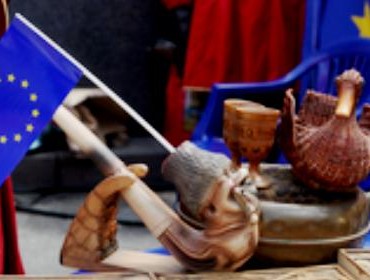Article by Serhiy Solodkyy, deputy director of the Institute of World Policy for EUobserverThe Ukrainian leadership is trying to demonstrate its democratic face. This could be the consequence of criticism towards President Viktor Yanukovych, which is of late constantly being expressed by Western governments.
The Ukrainian authorities are throwing the best of the best at succeeding in finishing negotiations on the Free Trade Area. This year could be crucial for future relations between the EU and Ukraine, and as such for the future of the whole of Europe.
Here is the chronology of last week’s events in Ukraine.
The main opposition leader of the country, Yulia Tymoshenko, was allowed to pay a visit to Brussels. She had been banned from travel due to the criminal proceedings initiated against her.
The Prosecutor General’s office launched a criminal probe against former President Leonid Kuchma. In this way Kyiv wants to demonstrate that not only opposition figures are being brought to trial in the country.
Ukrainian authorities also met the needs of the European Union by deciding not to invite the president of Belarus, Aleksander Lukashenko, to a conference marking the 25th anniversary of the Chernobyl Disaster.
However, President Yanukovych and his team made too many mistakes last year to regain the trust of their foreign partners with the help of a few decisions of this kind. So it would not be a big surprise if the European Union does not yet believe that Ukrainian authorities have cured themselves of the authoritarian syndrome.
Why do the Ukrainian authorities want to attract the EU’s attention? One can assume that mercantile ambitions are uppermost. Some say that Yanukovych, a man from the provinces, gets satisfaction from being in the company of world leaders. They also say that being a pro-European politician is trendy in Ukraine.
But there is another assumption: President Yanukovych has finally realised that Kiev can only have a real partnership with the European Union and that Ukraine-Russia relations can never reach this level.
It is said that disillusion with Russia was the real reason why Yanukovych has committing his best diplomatic and political resources into finalising the Deep and Comprehensive Free Trade Area with the European Union. That is why the deputy PM Andryi Kliuiev, who heads up negotiations, paid a second visit to Brussels in a month on Friday (25 March).
He met, among others, European neighbourhood commissioner Stefan Fule. The main issue is difficulties encountered by the Free Trade Area negotiators. President Yanukovych expects to sign the document by the end of the year. But the positions of the EU and Ukraine are so far from any compromise that there are considerable concerns the grand design for Ukraine-EU rapprochement could spectacularly fail.
Meanwhile, Russian diplomats are rubbing hands their hands with glee over the difficulties between Kiev and Brussels.
“You will not succeed anyway, so you will have to go back to the idea of the Customs Union with Russia, Kazakhstan and Belarus” – this is one favorite argument of the Russian diplomacy. “With the only difference that if now Ukraine can negotiate on equal terms about the Customs Union, in a year it will join on extremely disadvantageous conditions.”
This message was sent by the deputy PM of the Russian Federation, Igor Shuvalov, during his visit to Kiev. Russia’s Prime Minister Vladimir Putin even warned that Moscow will have to ‘react’ to the future FTA between the EU and Ukraine.
Activation of the EU-Ukraine talks has revealed Russia’s true face. Up till now Moscow had said that it strictly opposes Ukraine’s integration with Nato but that it has nothing against Ukraine joining the European Union. The current situation demonstrates vividly that Russia was lying: it has no intention of letting Ukraine slip out of its hands.
That is why EU-Ukraine relations are at a turning point. You can be skeptical about the democratic credentials of Ukrainian authorities. But the fact is that Viktor Yanukovych’s personal future and the future of his administration hangs on the EU Association Agreement.
The very future of Europe hangs on it as well. The fate of the agreement will determine whether the European Union shares its eastern borders with a mature democracy of 46 million people or with an unpredictable Kremlin hinterland.
The negotiations on the Free Trade Area are conducted confidentially, but the main areas of disagreement between the parties are well known. They include transport, Ukrainian grain exports and protection of geographical indicators in trade brands (the main problem is ‘cognac’ and ‘champagne’).
Who will give in for the sake of compromise? Maybe it should be Ukraine, which aspires to become an EU member. Or maybe the EU, which aspires to turn its eastern neighbor into a EU-like open market liberal democracy.
My point is that while hammering day day and night on the free trade talks, one should remember the pact is not about ‘cognac’ or grain. It is about important historical issues. While driving a hard bargain over a couple of million of euros, the EU could lose influence over this strategic country.
Civil society in Ukraine and the EU should urge their governments to take a more responsible approach. Ukraine is ready to compromise, but within limits. The Ukrainian delegation is not going to forego national interests just to sign the agreement.




Comments theme
Comments themeComments themeComments themeComments themeComments themeComments themeComments themeComments themeComments themeComments themeComments themeComments themeComments themeComments themeComments themeComments themeComments themeComments themeComments themeComments.